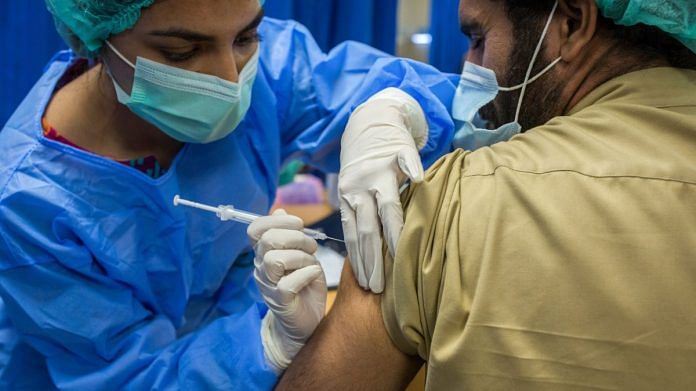Many nations are struggling to persuade reluctant citizens to get Covid-19 inoculations, but perhaps nowhere are the challenges as daunting as in Pakistan, where mistrust is fueled by anti-Muslim conspiracy theories and the legacy of the hunt for Osama bin Laden.
Mehrab Ali, a fruit merchant in Karachi, is one of many across the Islamic republic who won’t step forward after Prime Minister Imran Khan on Tuesday launched the nation’s vaccination drive. The father of six, who also refused to vaccinate his children against polio, argued that Covid-19 is a foreign plot against Muslims.
“Coronavirus is nothing but a conspiracy,” said the 43-year-old, sitting by his pushcart on a road leading to Karachi’s port. “I don’t believe the coronavirus exists nor does polio. I am not ready to accept that Jews and Christians sitting abroad are worried about the health of our children — no way.”
Ali’s views aren’t an outlier in Pakistan, which is the only country other than Afghanistan that has yet to eradicate polio. Almost half the more than 1,000 people surveyed by Gallup Pakistan last month said they won’t get vaccinated against Covid. That resistance will likely hamper efforts to inoculate the country’s population of more than 200 million people and, like polio, complicate global efforts to eradicate the disease.
“A lot of people in my country are in denial, they don’t think Covid is real,” said Ayesha Raza Farooq, a Pakistani senator who in 2018 received a government award for her work on polio eradication. “These are challenges similar to what we saw with polio campaigns.”
Dr Rana Imran sikander who heads the covid ward at PIMS became the first person to recieve covid vaccination to kick off the national covid vaccination drive in Pakistan pic.twitter.com/jDt1SwUCUb
— Asad Umar (@Asad_Umar) February 2, 2021
Resistance to vaccines across the globe has taken many forms. Places such as the U.S. are fighting the anti-vaxxer movement, while citizens in nations including India are wary of shots that haven’t yet cleared the final stage of human testing. In Pakistan, virulent anti-western sentiment around inoculations abound, fueled by conspiracy theories pushed by hard-line religious groups and spread across social media.
The mistrust goes deep, with health workers seen as spies and the ingredients going into doses being questioned.
Suspicion in the past decade only deepened when it emerged that a fake vaccination drive was used to hunt down bin Laden in the Pakistani city of Abbottabad, where he was assassinated in 2011 by American special forces. Mounting U.S. drone strikes around that time also led to a Pakistani Taliban decree against vaccinations.
‘Bad taste’
“That left a very bad taste among many rural and tribal areas,” Farooq said from Islamabad. “People were very suspicious of strangers knocking on their doors to inoculate them.”
Health workers were also targeted and killed by the Taliban and other groups, though security across Pakistan has markedly improved since a 2014 military operation neutered many domestic insurgent groups.
Now, more than two weeks after India started its vaccine campaign, Pakistan has begun to deploy the first 500,000 doses it received from China’s Sinopharm — a tiny fraction of what the government will eventually need. It is awaiting another 700,000 vials from the Chinese firm, and 17 million doses of AstraZeneca Plc’s shot from the World Health Organization-backed Covax initiative.
CanSino Biologics Inc., another Chinese producer, has completed a final stage human trial in Pakistan and has offered the country 20 million doses. Islamabad has also granted permission to Russia’s Sputnik V, which has been validated by global experts as being more than 90% effective. By year-end, Khan’s administration aims to inoculate 70% of its population over the age of 18, Faisal Sultan, Pakistan’s national health adviser, said in an interview.
Initial distribution among frontline workers will probably be successful, said Faisal Mahmood, a professor of infectious diseases at Karachi’s Aga Khan University who treated Pakistan’s first coronavirus patient. Firm avoidance may occur when the wider population is asked to roll up their sleeves, Mahmood added.
Nanobot conspiracy
Already conspiracies have been tested by the country’s legal system. The high court in Islamabad last month dismissed a petition from one individual aimed at blocking the vaccine drive by claiming the injections included animal DNA and nanobots.
Other problems are more based on reality. Outside Pakistan’s cities, Hasnain Ali Mirza, a provincial lawmaker from the southwestern region of Badin, complained that the closest vaccination center is more than 100 kilometers (62 miles) away. “Most won’t be able to travel that distance,” he said.
While Pakistan hasn’t registered a coronavirus outbreak close to the scale seen in India, it is coming off a second wave of infections that peaked in December — since the start of the pandemic, Pakistan has seen a total of 550,000 cases and about 12,000 deaths. As such, widespread vaccine boycotts could have wider implications as new mutations emerge.
“If we do not work together and control the transmission everywhere, just like polio, everyone is at risk,” said Rana Jawad Asghar, a leading Pakistani epidemiologist and adjunct professor at the University of Nebraska. –Bloomberg
Also read: In Pakistan, the cow has arrived. With it, comes Imran Khan’s new revolution



